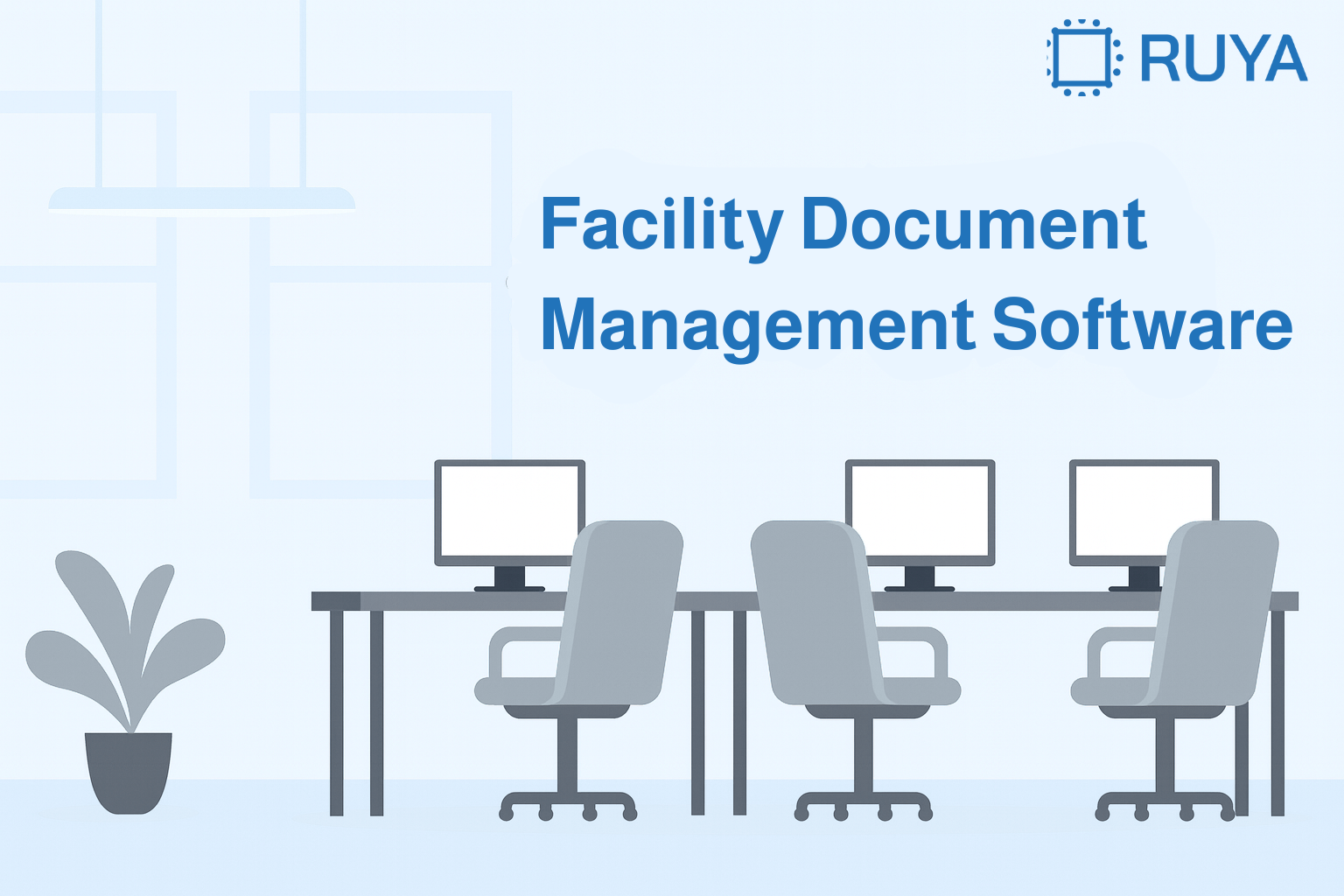Our list of the top 8 hospital vendor management software for healthcare efficiency
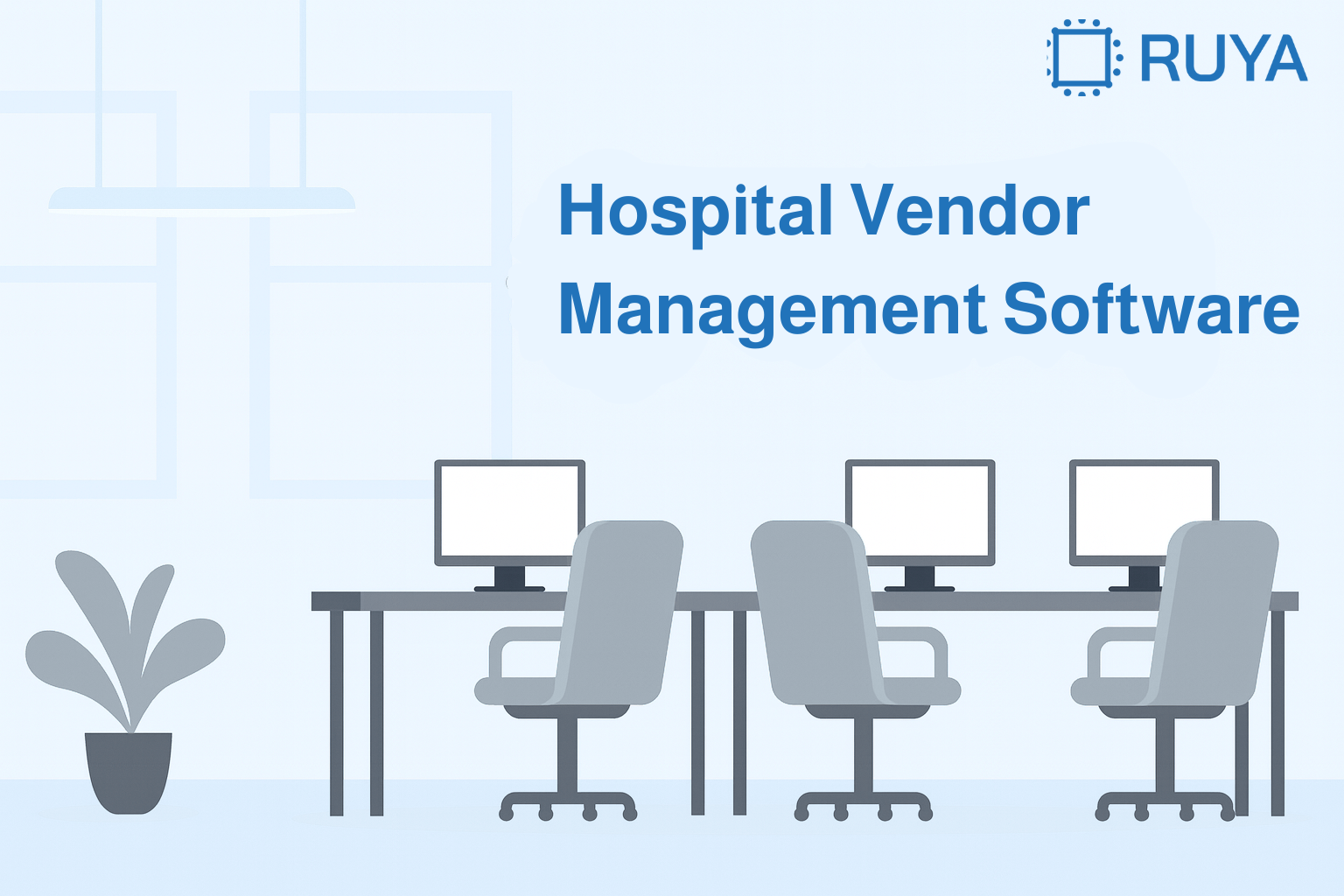
Quick summary
We explore the top hospital vendor management software tools, including Ruya, Kimedics, Tipalti, and Oracle Healthcare Cloud, that streamline operations, ensure compliance, and improve vendor performance. This guide highlights key features, benefits, and pricing to help optimize vendor relationships and improve overall facility management.
Looking to optimize vendor management in your hospital?
In 2023, over 93 million records were exposed in vendor-associated breaches, showing how critical effective vendor management is for hospitals. Vendor relationships in large hospital systems impact compliance, safety, and operational efficiency.
When vendor data is scattered across spreadsheets, outdated portals, or siloed systems, even small mistakes can cause regulatory penalties or delays. For hospitals managing hundreds of vendors across multiple campuses, manual tracking isn’t just inefficient; it’s risky.
Hence, in this Ruya guide, we’ve compiled the top 8 hospital vendor management software to help healthcare organizations centralize vendor data, streamline compliance, and improve operational workflows.
But first…
Why listen to us?
At Ruya, our specialized platform has helped dozens of large hospital systems streamline facility and vendor management across multiple campuses. Our hands-on experience with complex healthcare operations gives us the insight to recommend the most effective solutions for optimizing vendor oversight and improving operational efficiency in hospitals.

What is hospital vendor management software?
Hospital vendor management software is a tool that helps healthcare organizations streamline the management of third-party vendors. It centralizes vendor data, simplifies procurement processes, and ensures compliance with healthcare regulations.
With real-time, mobile-friendly access, teams can monitor vendor activities, perform inspections, and improve communication, reducing administrative workload and reliance on IT systems.
Why is hospital vendor management software important?
- Centralized information: It consolidates all vendor data into a single platform, making access easier and more efficient.
- Regulatory compliance: Helps hospitals maintain compliance with industry regulations by tracking vendor performance and documentation.
- Cost control: Streamlining procurement and monitoring vendor performance enables hospitals to reduce costs and improve budgeting.
- Improved efficiency: Automates administrative tasks like invoicing and contract management, freeing up staff to focus on higher-value work.
- Enhanced communication: Ensures better coordination with vendors through real-time updates and clear communication channels.
Top 8 hospital vendor management software
- Ruya
- Kimedics
- Tipalti
- Oracle Healthcare Cloud
- SoftClinic GenX
- BlueSky
- symplr Access
- Waystar Agency Manager
1. Ruya
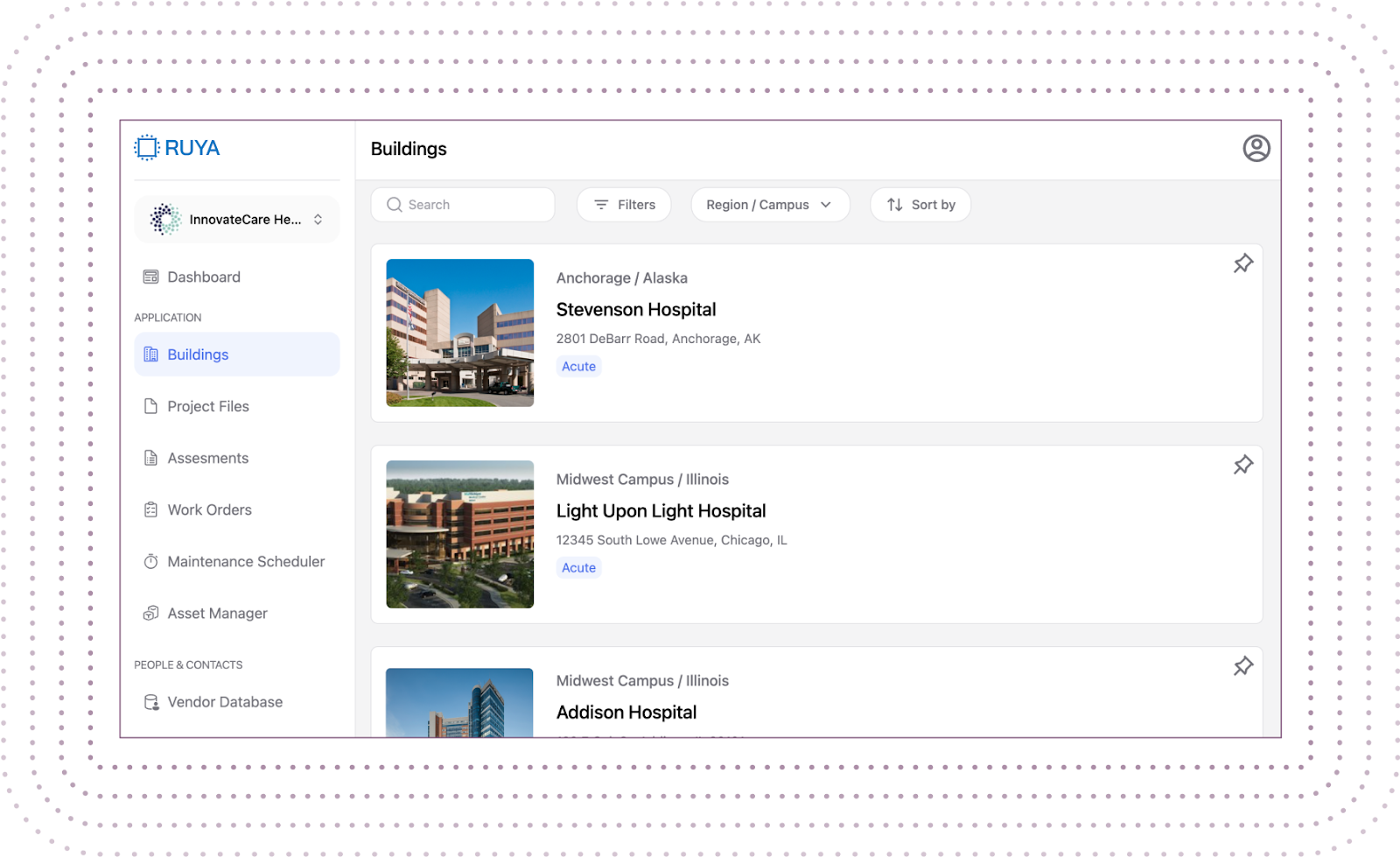
Ruya is a mobile-first platform built for large hospital systems. It centralizes facility management, compliance workflows, vendor data, and life safety collaboration into one unified hub.
Beyond centralization, Ruya helps teams track tasks, update records, and make decisions on the go. With real-time, mobile access, hospitals can improve efficiency, maintain compliance, and keep assets and vendors audit-ready, without heavy IT reliance.
Key features
- Mobile inspections with code checklists: Conduct inspections directly from mobile devices using built-in code checklists, eliminating the need for paper forms and manual uploads.
- Real-time floor plan updates: Access and manage up-to-date floor plans in multiple formats (PDF, DWG, Revit), so that accurate information is always available.
- Centralized vendor and asset directory: Organize vendor and asset information by individual building or campus, simplifying access and management.
- Life safety plan collaboration: Facilitate collaboration on life safety plans without requiring network access, keeping all stakeholders aligned and informed.
- Reduced IT dependency: Operate without the need for extensive IT infrastructure, simplifying implementation and reducing overhead costs.
Pricing
We offer custom pricing based on the number of campuses and required modules. For a tailored quote, contact us directly.
Pros
- Field teams can complete inspections from mobile devices and close out tasks on site, reducing back-and-forth and speeding issue resolution.
- Connects vendor credentials and assets directly to specific buildings, making searches and approvals faster and more accurate.
- Life-safety consultants can update plans without VPN/network access, improving compliance response times.
- Keeps floor-plans in sync across formats (PDF, DWG, Revit); users say drawing updates happen “once, then done.”
- Facilities teams report faster rollout compared to legacy CMMS tools.
Cons
- A few teams noted the vendor-directory setup needed an initial cleanup effort to map all buildings correctly.
2. Kimedics
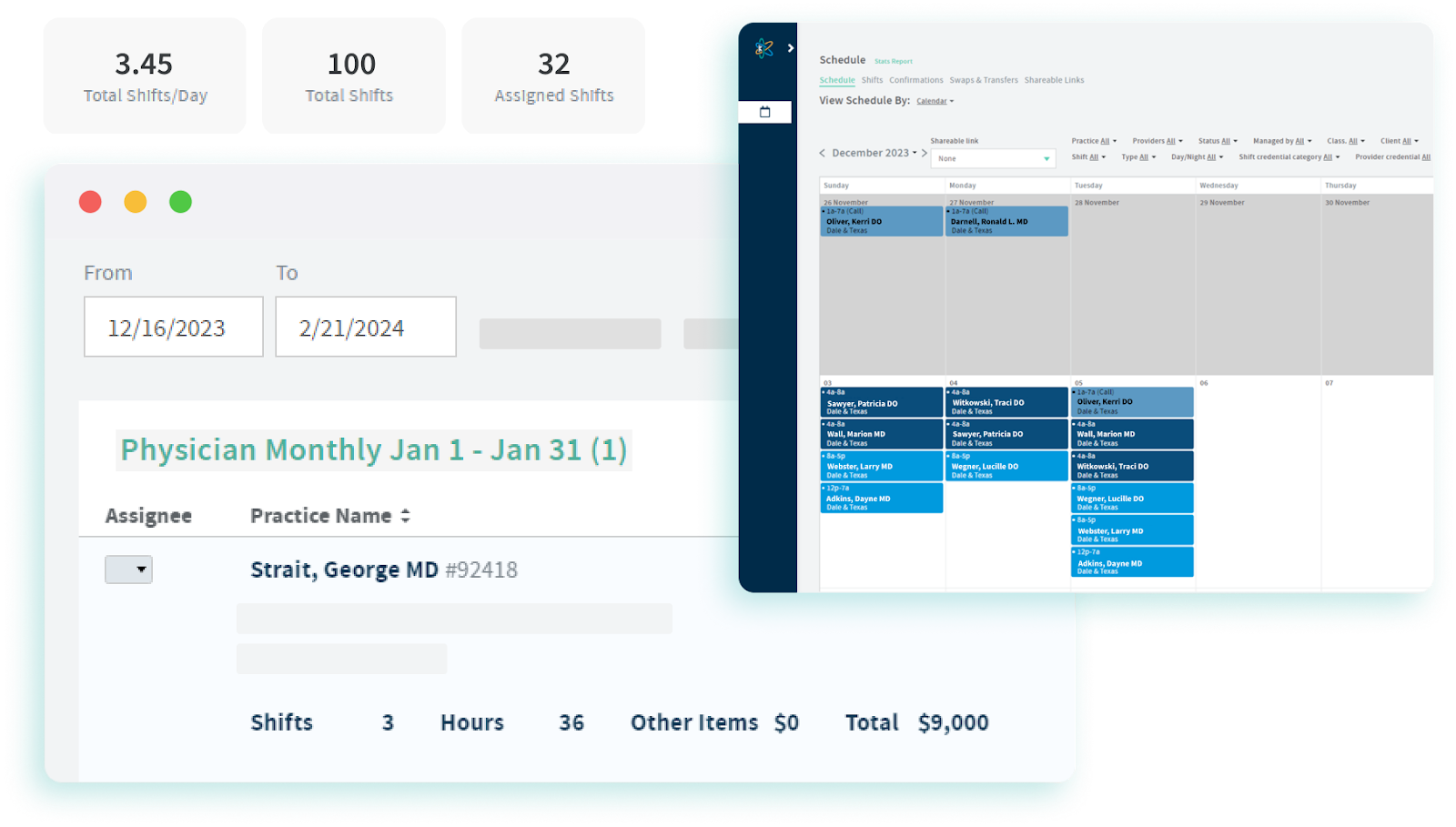
Kimedics is a healthcare-specific workforce relationship management platform that streamlines clinician management for large health systems and staffing agencies. The platform centralizes scheduling, credentialing, and financial operations into a unified system, enhancing collaboration between internal teams and external vendors.
Key features
- Vendor portal: Facilitates seamless communication and collaboration between hospitals and staffing vendors.
- Real-time provider information: Tracks clinician credentials, availability, and preferences for efficient scheduling.
- Shift management: Assigns and monitors shifts to reduce gaps and ensure coverage.
- Analytics dashboard: Provides insights into workforce metrics and cost optimization.
- Mobile access: Allows clinicians and administrators to access schedules, claim shifts, and manage tasks on the go.
Pricing
Kimedics offers three pricing tiers based on team size: Starter (up to 49 staff), Grow (50–199 staff), and Enterprise (200+ staff). Pricing is customized, and users must book a demo for a tailored quote.
Pros
- Streamlines clinician onboarding, scheduling, and payroll processes for large staffing pools.
- Cuts scheduling email threads by enabling shift posting directly to clinicians and vendors.
- Reduces scheduling errors by giving admins real-time access to clinician availability.
- Improves compliance tracking with up-to-date credential visibility.
Cons
- May require additional customization to integrate with certain existing systems.
- Vendor contract management capabilities are limited for complex agreements.
3. Tipalti
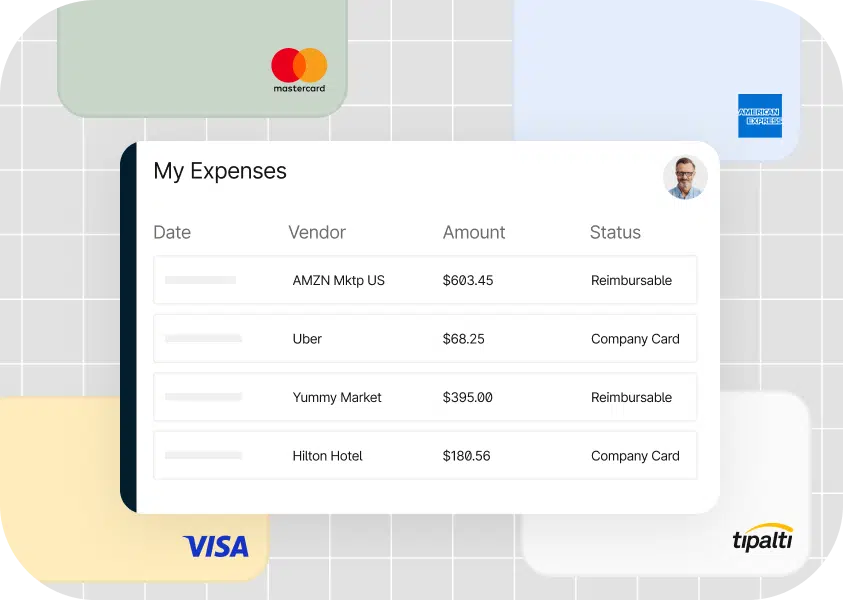
Tipalti is a comprehensive accounts payable and supplier payments platform that automates financial operations for healthcare organizations. It centralizes supplier onboarding, invoicing to final payments, giving hospitals real-time visibility into vendor transactions, and ensuring compliance across global operations.
Key features
- Self-service supplier portal: Enables vendors to manage their own payment preferences, reducing administrative workload.
- Touchless invoicing: Uses machine learning to automatically capture, match, and process invoice data.
- Global payment capabilities: Supports payments in over 190 countries, 120 currencies, and 50+ payment methods.
- Tax compliance management: Automates the collection and validation of tax forms.
- Fraud prevention: Implements advanced fraud detection mechanisms to safeguard against unauthorized transactions.
Pricing
Tipalti offers tiered plans for accounts payable and mass payments.
- Pricing starts at $99/month for basic automation, with advanced plans at $199/month and enterprise options with custom quotes.
Pros
- Supports a wide range of currencies and payment methods, simplifying large hospital operations.
- Vendors can track invoice status without AP intervention, reducing AP inquiries.
- Flags duplicate invoices, lowering over-payment risk.
- Integrates with ERPs like NetSuite and QuickBooks for seamless data flow.
Cons
- Custom reporting options are limited, requiring workarounds for complex financial insights.
- Integration issues and sync errors (e.g., with NetSuite) have disrupted vendor invoice flows in large implementations.
4. Oracle Healthcare Cloud
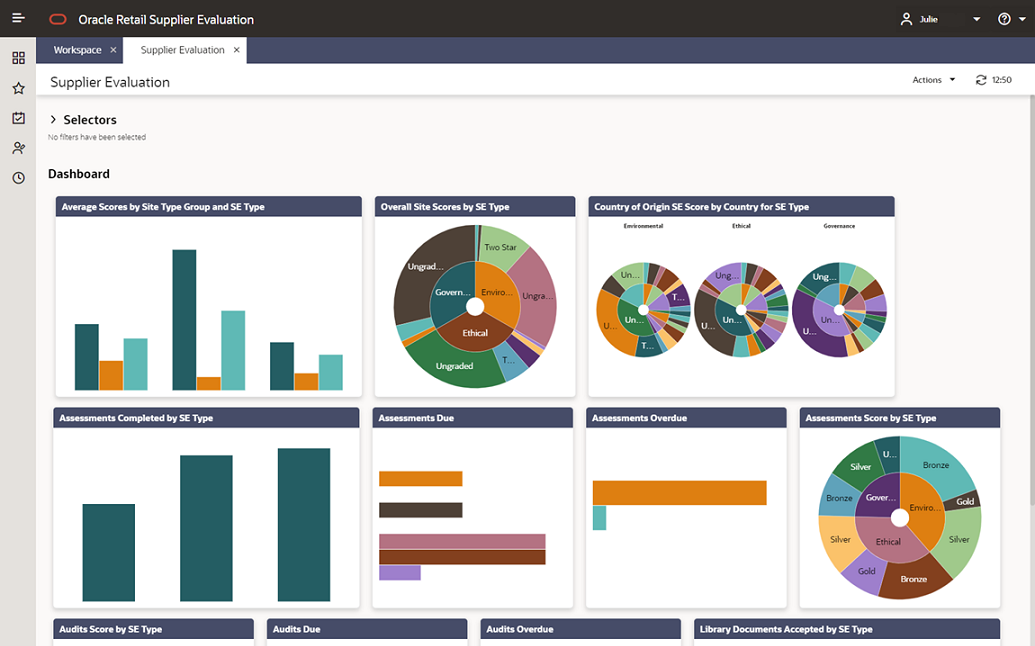
Oracle Healthcare Cloud is a comprehensive platform that streamlines hospital operations by integrating clinical, financial, and supply chain management. Built on Oracle Cloud Infrastructure (OCI), it provides hospitals with scalable, secure, and centralized management of vendors, inventory, and procurement workflows.
Key features
- Supplier portal: Facilitates self-service supplier onboarding, registration, and management.
- Procurement automation: Streamlines requisitioning, purchase orders, and invoicing.
- Inventory management: Provides real-time visibility into inventory levels.
- Analytics and reporting: Offers advanced analytics tools to monitor supplier performance, track spending, and identify cost-saving opportunities.
- Integration capabilities: Connects with existing hospital systems for seamless data flow.
Pricing
Customized based on the organization’s size and needs; contact Oracle for a tailored quote.
Pros
- Supports adherence to industry standards and regulations.
- Scales well for multi-campus hospital systems with broad vendor networks.
- Backed by Oracle’s global support and infrastructure reliability.
- Configurable workflows allow tailored vendor onboarding and approval paths per building or campus.
Cons
- Implementation can be lengthy and resource-intensive for facilities with limited internal IT teams.
- Some users report complexity when configuring vendor-specific modules and custom workflows.
5. SoftClinic GenX
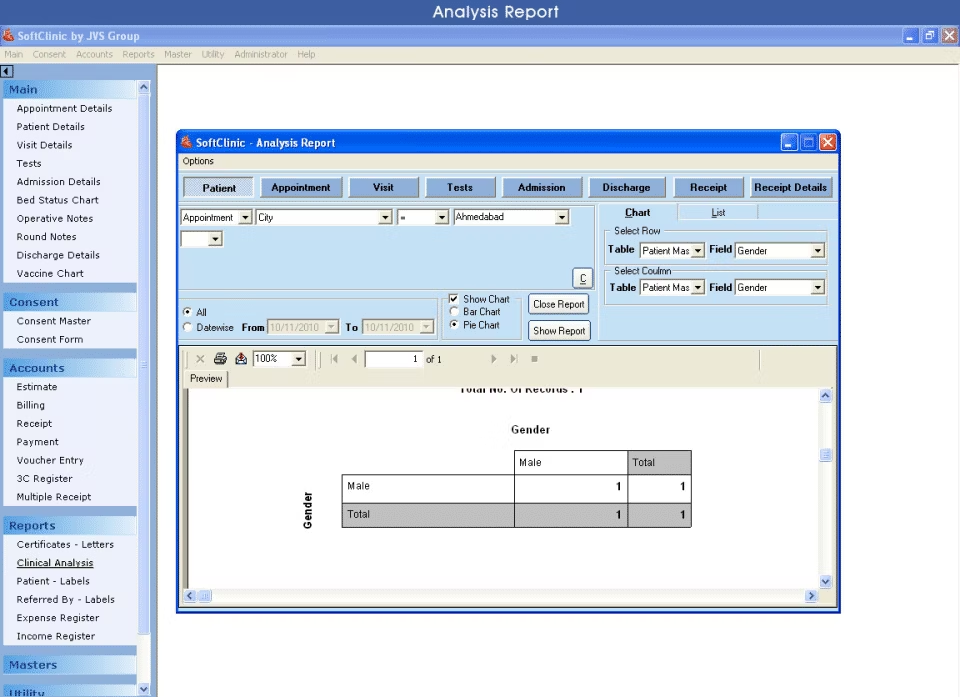
SoftClinic GenX is a modular hospital management platform that optimizes both clinical and administrative operations. Designed for hospitals of varying sizes, it centralizes patient records, billing, scheduling, and inventory management, helping staff streamline workflows and maintain compliance across departments.
Key features
- Inventory management: Tracks and manages hospital supplies and pharmaceuticals, ensuring optimal stock levels and timely reordering.
- Billing and invoicing: Generates accurate statements integrated with patient records.
- Appointment scheduling: Optimizes patient flow and resource allocation.
- Patient records management: Maintains comprehensive digital records for better care coordination.
- Multi-user access: Supports multiple users with role-based access, ensuring secure and organized data management.
Pricing
Enterprise hospital deployment requires custom quotes.
Pros
- Tailored features support hospital-specific workflows and regional requirements.
- Reduces administrative workload with integrated patient and financial management.
- Offers reliable customer service and technical assistance.
- Improves coordination between outpatient and inpatient operations.
Cons
- Mobile applications have received mixed reviews regarding functionality and user experience.
- Support response times can be inconsistent.
6. BlueSky
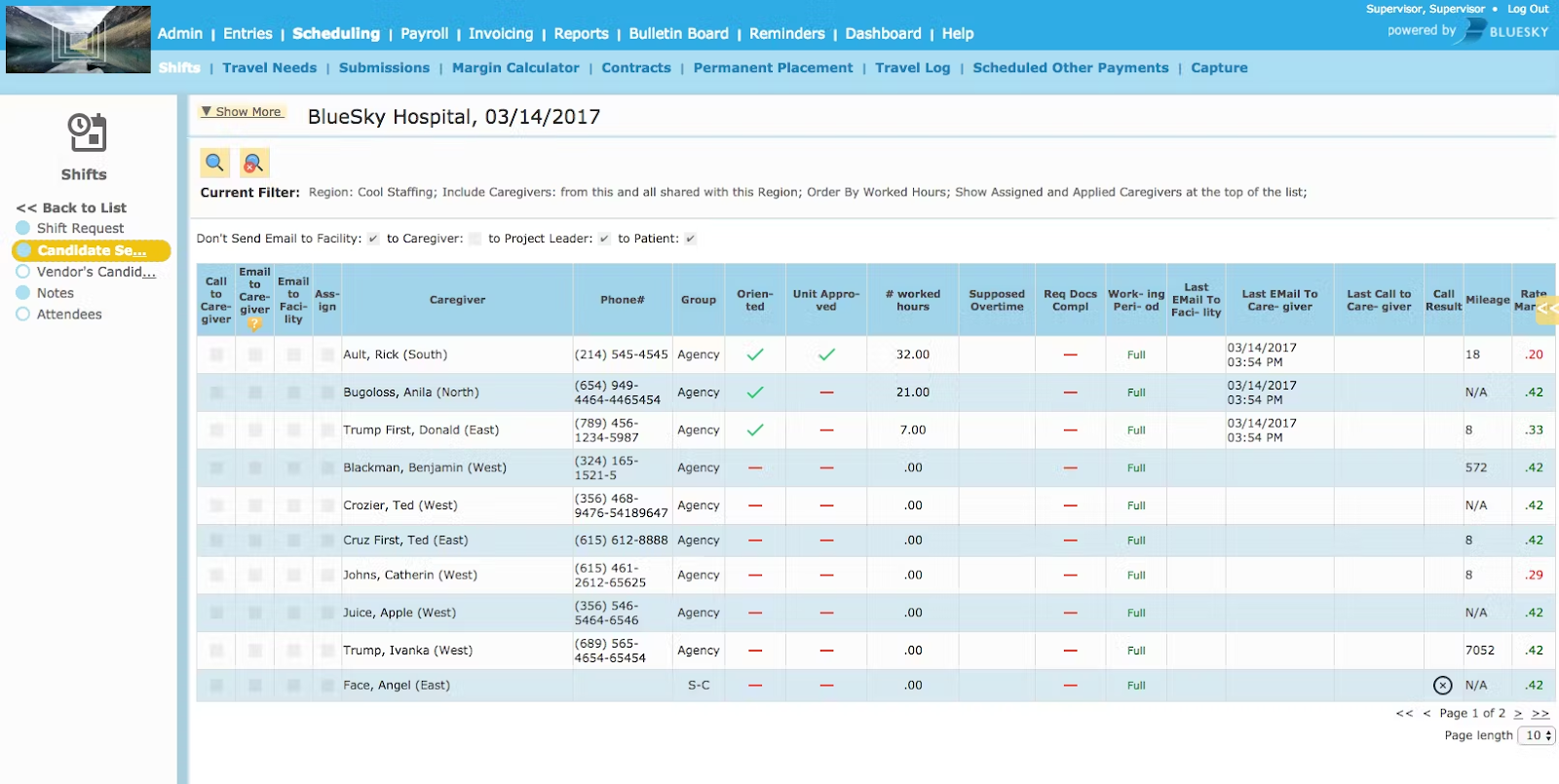
BlueSky is a cloud-based credentialing and vendor management platform built specifically for healthcare organizations. It centralizes provider onboarding, contract compliance, and vendor documentation, helping hospitals reduce administrative bottlenecks and maintain regulatory readiness across facilities.
Key features
- Credentialing automation: Automates the process of verifying and maintaining staff credentials.
- Vendor contract management: Monitors contract terms and renewal dates in one platform.
- Document repository: Stores audit-ready files for each provider or vendor.
- EReporting and analytics: Offers compliance tracking and performance insights.
- Workflow automation: Streamlines approval processes for faster onboarding.
Pricing
BlueSky offers a one-time licensing fee starting at $3,500. Pricing is custom and based on modules and user volume; contact BlueSky for enterprise quotes.
Pros
- Scales easily to support fluctuating staffing needs across multiple hospital campuses.
- Built-in compliance tools help facilities stay aligned with industry standards and audit requirements.
- Supports multi-facility staffing by routing requests to multiple agencies.
- Custom permission layers allow hospital teams to control which vendors see which data.
Cons
- Performance issues with systems becoming slow or crashing under heavy usage, especially in staffing peaks.
- Custom development for specific workflows (e.g., non-nursing roles, specialized scheduling) is limited and may require workarounds or external resources.
7. symplr Access
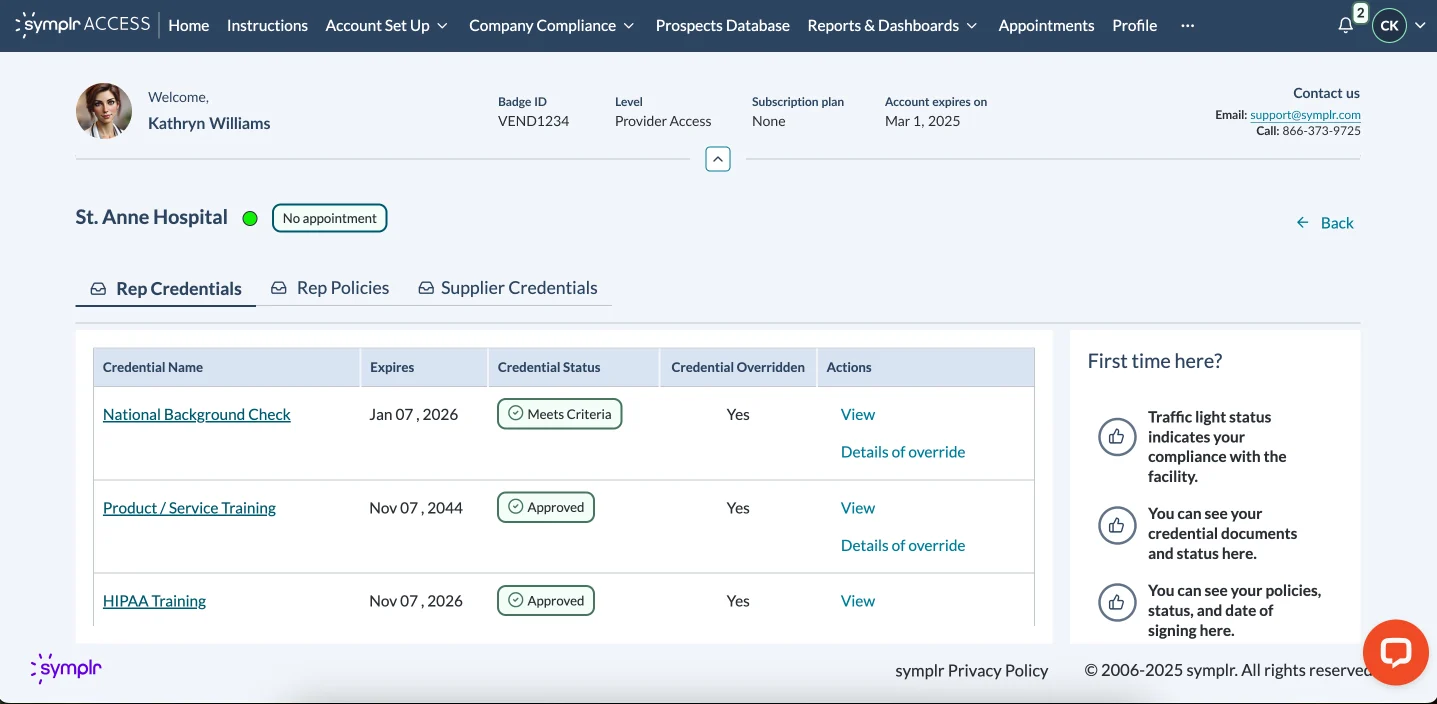
symplr Access is a healthcare-focused vendor credentialing and facility access platform designed to help hospitals control on-site vendor activity. Used by major U.S. health systems, it centralizes credential verification and access permissions, ensuring only authorized vendors enter clinical or restricted areas. The platform enhances security while supporting regulatory compliance and audit readiness.
Key features
- Secure facility access control integration: Emphasizes physical access control and security rather than documentation
- Mobile check-in: Allows vendors to check in via a mobile app, reducing bottlenecks at entry points.
- Real-time access tracking: Shows live vendor presence across facilities for improved oversight.
- Customizable access policies: Enable healthcare organizations to set and enforce facility-specific access policies, ensuring consistent compliance.
- Integration capabilities: Integrates with existing healthcare systems, facilitating seamless data flow and reducing administrative workload.
Pricing
Subscription-based pricing; custom quotes available upon request
Pros
- Provides up-to-date information on vendor presence, aiding in security and compliance.
- Real-time visibility into vendor activity improves both security and compliance audit readiness.
- Flexible access policies help hospitals control vendor permissions based on role, time, or location.
- Dashboards allow facility managers to view and manage vendor access across dozens of companies simultaneously.
Cons
- Users report slow response times from support during issue resolution.
- Reporting capabilities still require manual workarounds or advanced training.
8. Waystar Agency Manager
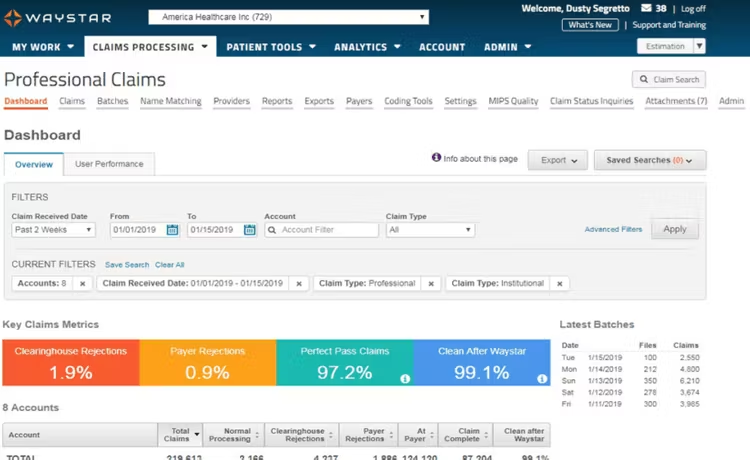
Waystar Agency Manager is a healthcare-focused vendor management and staffing coordination solution built to streamline communication between hospitals and staffing agencies. It centralizes vendor submissions, placement tracking, and credential verification to ensure continuous coverage across clinical departments while maintaining regulatory compliance.
Key features
- Agency performance scorecards: Tracks recovery rates, response times, and compliance metrics to rank agencies by performance.
- Invoice verification technology: Enables real-time validation of invoices to ensure accuracy before processing.
- Reconciliation tools: Matches accounts to the correct agency with audit-ready documentation.
- Comprehensive performance reporting: Delivers detailed insights into agency activities, helping identify areas for improvement.
- Seamless integration: Works in conjunction with other Waystar solutions for a unified revenue cycle management experience.
Pricing
Pricing for Waystar Agency Manager is customized based on the organization's size and specific needs.
Pros
- Helps reduce revenue leakage by catching billing discrepancies before payment.
- Users can trace agency obligations and performance against outlined terms in real time.
- Vendor managers can respond faster to under-performing agencies thanks to built-in metrics.
- Strengthens financial oversight with automated compliance and audit trails.
Cons
- Initial configuration can be lengthy, especially when aligning multiple agency contracts and workflows.
- Advanced reporting customization may require assistance from Waystar support or professional services.
Streamline Hospital Vendor Management with Ruya
Healthcare operations are increasingly complex, and vendor oversight now plays a direct role in compliance, cost control, and patient safety. Relying on manual systems or outdated tools creates risk, delays, and unnecessary workload for hospital teams.
Ruya provides a unified, hospital-focused vendor management platform that centralizes credentialing, compliance tracking, and vendor performance, helping large health systems reduce administrative burden while improving accountability and operational reliability.
Book a demo to see how Ruya can transform your hospital’s vendor management.

.svg)
